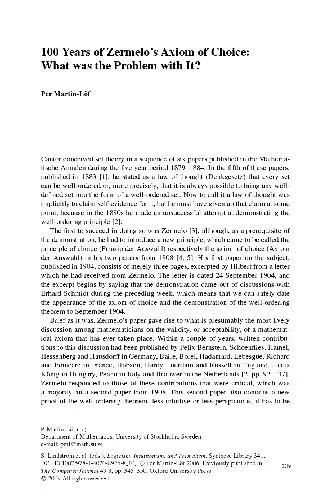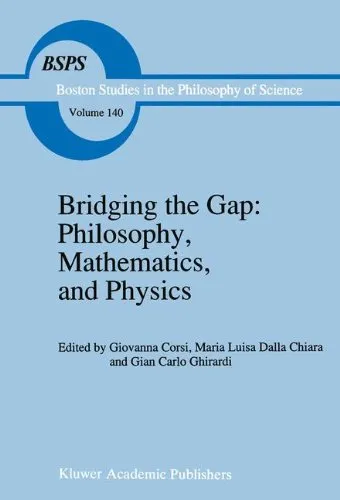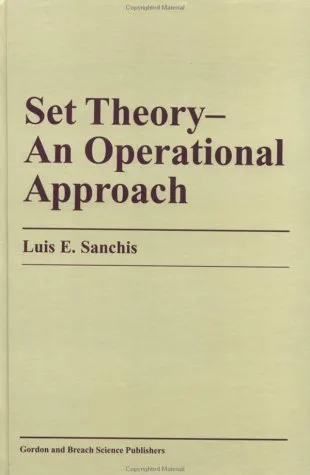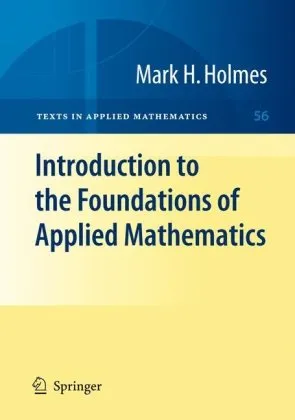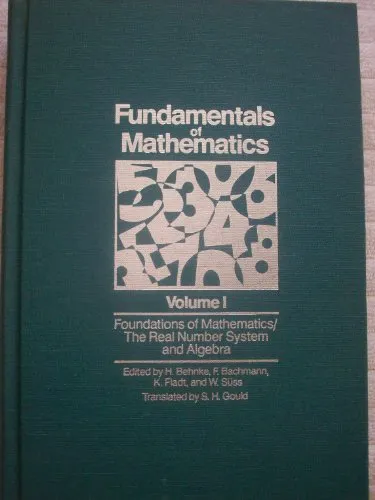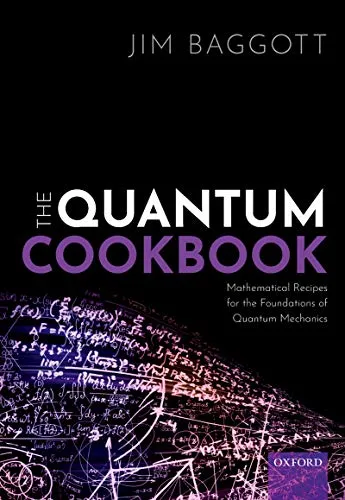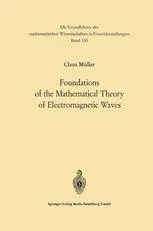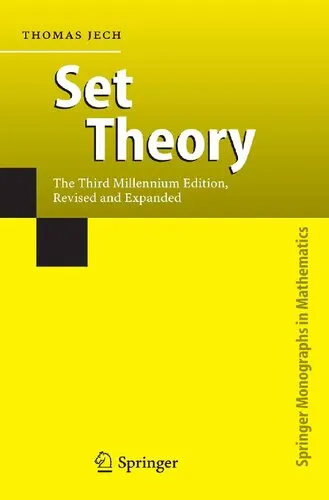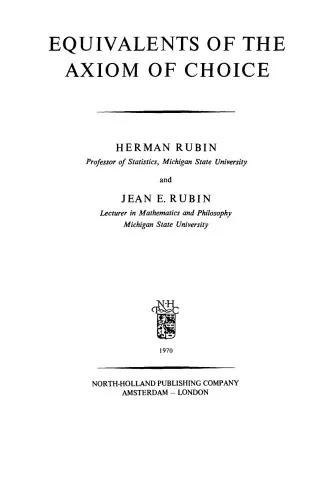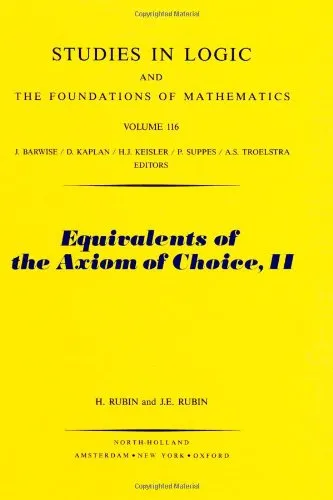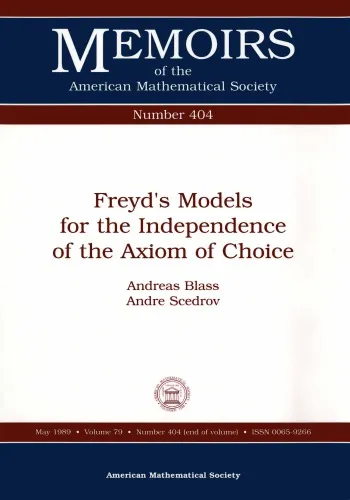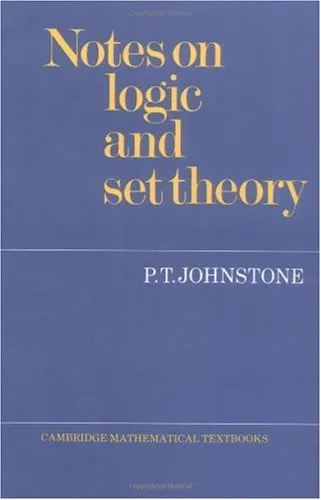100 Years of Zermelos Axiom of Choice What was the Problem with It
4.5
بر اساس نظر کاربران

شما میتونید سوالاتتون در باره کتاب رو از هوش مصنوعیش بعد از ورود بپرسید
هر دانلود یا پرسش از هوش مصنوعی 2 امتیاز لازم دارد، برای بدست آوردن امتیاز رایگان، به صفحه ی راهنمای امتیازات سر بزنید و یک سری کار ارزشمند انجام بدینکتاب های مرتبط:
معرفی کتاب "100 Years of Zermelo's Axiom of Choice: What was the Problem with It"
کتاب "100 Years of Zermelo's Axiom of Choice: What was the Problem with It" اثری جامع و تحلیلی در باب یکی از مفاهیم بنیادی منطق ریاضی و نظریه مجموعهها است. این کتاب به تحلیل تاثیرات اصول موضوعه Zermelo's Axiom of Choice در طی صد سال گذشته پرداخته و به بررسی جنبههای فلسفی، منطقی و ریاضی این اصل میپردازد.
خلاصهای از کتاب
اصل موضوعه Zermelo's Axiom of Choice به عنوان یکی از اصول کلیدی نظریه مجموعهها شناخته میشود که بحثهای زیادی را در طول یک قرن گذشته برانگیخته است. این اصل که در ابتدا توسط Ernst Zermelo در سال 1904 معرفی شد، به یک نقطه مرکزی در درک ساختارهای ریاضی بدل شده است. این کتاب با توضیح دقیق پایههای تاریخی این اصل آغاز میشود و سپس به ارائهٔ مفصل چالشها و تناقضهایی میپردازد که در نتیجه پذیرش آن در نظامهای ریاضی به وجود آمده است. یکی از بخشهای کلیدی کتاب، تأکید بر مشکلات فلسفی این اصل است که شامل مواردی چون paradoxهای مرتبط با نام Banach-Tarski و مسائل مربوط به Determinacy میباشد.
علاوه بر بررسی مشکلات، نویسنده به اهمیت Axiom of Choice در توسعه ریاضیات نوین نیز پرداخته است. مفاهیمی چون cardinality و تاثیر Axiom of Choice بر توابع غیرقابل محاسبه نیز در این متن بهطور جامع تحلیل میشوند. از دیدگاه آموزشی، این کتاب یک مرجع بینظیر برای افرادی است که به مطالعه و جستجو در زمینههای عمیقتر نظریه مجموعهها علاقه دارند.
نکات کلیدی کتاب
- درک پایهای از تاریخچهٔ Axiom of Choice و نقش آن در نظریه مجموعهها.
- بررسی جنبههای فلسفی و منطقی مرتبط با پذیرش یا رد این اصل.
- تحلیل تناقضات و چالشهای به وجود آمده ناشی از استفاده آن در نظریه ریاضی.
- مطالعه تأثیر Axiom of Choice بر مفاهیمی چون cardinality و infinity.
- ارائه دیدگاهی انتقادی و تحلیلی بر استفادههای عملی این اصل.
نقل قولهای معروف از کتاب
"The Axiom of Choice is not just a principle of convenience; it reflects the philosophical tension underlying our understanding of infinity."
"Mathematics, without the Axiom of Choice, is like a ship sailing with an incomplete map; it can navigate, but often at the cost of precision."
چرا این کتاب اهمیت دارد
کتاب "100 Years of Zermelo's Axiom of Choice: What was the Problem with It" نه تنها برای ریاضیدانان، بلکه برای فلاسفه نیز یک مرجع مهم و ارزشمند به شمار میآید. این اثر با زبانی تحلیلی و دقیق، به تحلیل یکی از چالشبرانگیزترین اصول ریاضیات میپردازد و روشن میسازد که چگونه این اصل به طور قابل توجهی بر توسعه تفکر ریاضی و متافیزیکی تأثیر گذاشته است. از این دیدگاه، این کتاب به خوانندگان کمک میکند تا با دیدگاهی گستردهتر، رابطه میان اصول منطقی و جهان ریاضیات را درک کنند.
علاوه بر این، این کتاب به دلیل ارتباط مستقیم با مباحث پیچیدهای نظیر infinity و paradox، برای دانشجویان و محققین علوم ریاضی و فلسفه مناسب است. با ارائه تحلیلهای دقیق و پرداختن به جزئیات تاریخی و فنی، کتاب اهمیت اصول بنیادین در ساختارهای ریاضیاتی را به تصویر کشیده و خوانندگان را برای درک عمیقتر آماده میکند. به همین دلیل، اثری ماندگار و حائز اهمیت در مطالعات این حوزه به شمار میرود.
Introduction to "100 Years of Zermelo's Axiom of Choice: What Was the Problem with It"
The Axiom of Choice stands as one of the most controversial and pivotal principles in the foundation of modern mathematics. Proposed by Ernst Zermelo in 1904, this seemingly simple assertion has generated over a century of debate, influencing everything from the philosophy of mathematics to the study of set theory and algebra. "100 Years of Zermelo's Axiom of Choice: What Was the Problem with It" takes readers on a profound journey into the heart of this mathematical axiom, exploring its origins, controversies, implications, and enduring significance in contemporary thought.
This book is not just a historical or philosophical exploration—it is an invitation to revisit the core of logical reasoning and mathematical rigor. Over the last hundred years, the Axiom of Choice has been labeled both indispensable and problematic, foundational and paradoxical. Why has it sparked such polarized responses? What exactly is the nature of the "problem" with it? This book provides an in-depth, accessible explanation of its role in mathematics, examining the different interpretations, proofs, and paradoxes associated with it.
Written for mathematicians, philosophers, and intellectually curious readers alike, this book bridges the technical complexities of logic with historical and philosophical insights. It evaluates not only the technical critiques of the Axiom of Choice but also the underlying philosophical assumptions that have fueled its contentious position in mathematics.
Summary of the Book
The book unfolds in three main sections, each crafted to deepen the reader’s understanding of the Axiom of Choice's place in mathematics and its surrounding debates.
In the first section, we delve into the origins of the Axiom of Choice, tracing its formulation by Ernst Zermelo in the early 20th century. This section discusses the formal definition of the axiom, illustrating its application in set theory and its critical importance to the proofs of mathematical results. Additionally, the connection between Zermelo's axiom and Hilbert's program of formalizing mathematics is explored.
The second section takes a comprehensive look at the controversies and counterintuitive results stemming from the Axiom of Choice. From the Banach–Tarski Paradox to the philosophical unease about its "non-constructive" nature, this part explores the axiom’s dual legacy as indispensable yet paradoxical. It also contrasts constructivist and formalist perspectives, shedding light on why some mathematicians have resisted its universal acceptance.
In the final section, the book reflects on contemporary implications of the Axiom of Choice in the context of advanced mathematical theories and philosophy. It evaluates how modern logicians incorporate or reject the axiom in areas such as model theory, topology, and computer science. The conclusion ties together these threads, offering a thought-provoking meditation on the compatibility of mathematical rigor and philosophical foundations.
Key Takeaways
- The Axiom of Choice is both a powerful tool and a source of paradoxes in mathematics.
- It has far-reaching implications beyond set theory, influencing fields like algebra, topology, and logic.
- Criticisms of the axiom highlight the philosophical tensions between constructivist and formalist approaches in mathematics.
- Understanding the historical and philosophical debates surrounding the axiom enriches our broader view of mathematical reasoning.
Famous Quotes from the Book
"The Axiom of Choice is not merely a mathematical proposition; it is a mirror held up to the nature of mathematical truth itself."
"In embracing the Axiom of Choice, we open the door to powerful proofs and perplexing paradoxes—mathematics is never untouched by the choices of its foundations."
"To understand the Axiom of Choice is to understand the dual edge of mathematical creativity: rigor and abstraction intertwined with intuition and uncertainty."
Why This Book Matters
"100 Years of Zermelo's Axiom of Choice: What Was the Problem with It" is much more than a historical chronicle. It is a vital exploration of the ideas and assumptions that form the bedrock of mathematics.
As mathematics continues to evolve and grow more complex, understanding the foundational principles it rests upon is crucial for both professional mathematicians and students of philosophy. The Axiom of Choice embodies the tensions between intuition, abstraction, and logical rigor—themes that remain integral to the discourse on mathematical truth. This book provides a rare opportunity to bridge the technical and the humanistic, enabling readers to appreciate one of mathematics' most enduring debates from multiple angles.
For anyone interested in the philosophy of mathematics, the history of logical thought, or the sheer intellectual challenge presented by foundational disputes, this book provides a substantial, engaging, and thought-provoking guide.
دانلود رایگان مستقیم
شما میتونید سوالاتتون در باره کتاب رو از هوش مصنوعیش بعد از ورود بپرسید
دسترسی به کتابها از طریق پلتفرمهای قانونی و کتابخانههای عمومی نه تنها از حقوق نویسندگان و ناشران حمایت میکند، بلکه به پایداری فرهنگ کتابخوانی نیز کمک میرساند. پیش از دانلود، لحظهای به بررسی این گزینهها فکر کنید.
این کتاب رو در پلتفرم های دیگه ببینید
WorldCat به شما کمک میکنه تا کتاب ها رو در کتابخانه های سراسر دنیا پیدا کنید
امتیازها، نظرات تخصصی و صحبت ها درباره کتاب را در Goodreads ببینید
کتابهای کمیاب یا دست دوم را در AbeBooks پیدا کنید و بخرید
1265
بازدید4.5
امتیاز0
نظر98%
رضایتنظرات:
4.5
بر اساس 0 نظر کاربران
Questions & Answers
Ask questions about this book or help others by answering
No questions yet. Be the first to ask!
